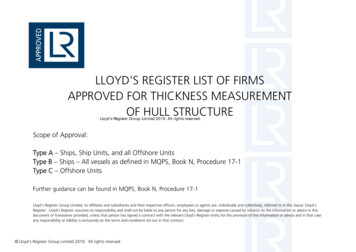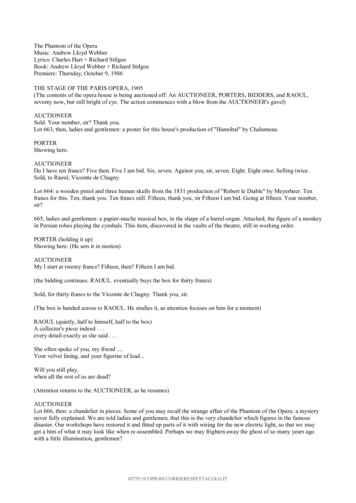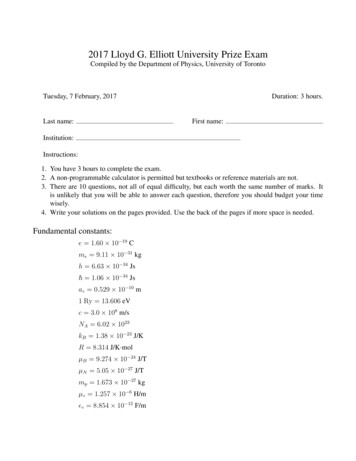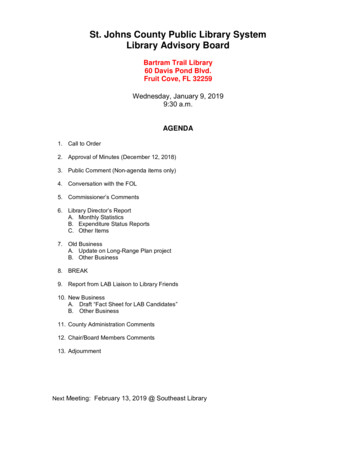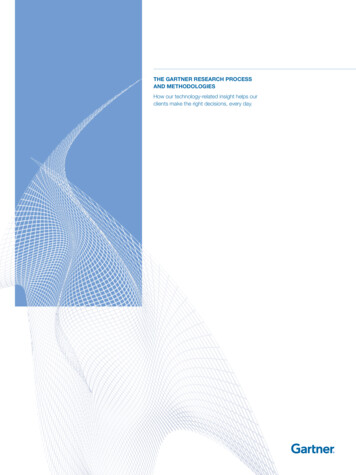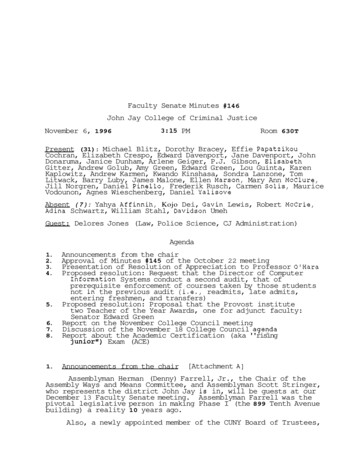
Transcription
Faculty Senate Minutes #146John Jay College of Criminal JusticeNovember 6, 19963:15 PMRoom 630TPresent (31): Michael Blitz, Dorothy Bracey, Effie PapatzikouCochran, Elizabeth Crespo, Edward Davenport, Jane Davenport, JohnDonaruma, Janice Dunham, Arlene Geiger, P.J. Gibson, ElisabethGitter, Andrew Golub, Amy Green, Edward Green, Lou Guinta, KarenKaplowitz, Andrew Karmen, Kwando Kinshasa, Sondra Lanzone, TomLitwack, Barry Luby, James Malone, Ellen Marson, Mary Ann McClure,Jill Norgren, Daniel Pinello, Frederik Rusch, Carmen Solis, MauriceVodounon, Agnes Wieschenberg, Daniel YalisoveAbsent ( 7 ) : Yahya Affinnih, Kojo Dei, Gavin Lewis, Robert McCrie,Adina Schwartz, William Stahl, Davidson UmehGuest: Delores Jones (Law, Police Science, CJ Administration)Agenda1.2.3.4.5.6.7.8.Announcements from the chairApproval of Minutes #145 of the October 22 meetingPresentation of Resolution of Appreciation to Professor O'HaraProposed resolution: Request that the Director of ComputerInformation Systems conduct a second audit, that ofprerequisite enforcement of courses taken by those studentsnot in the previous audit (i.e., readmits, late admits,entering freshmen, and transfers)Proposed resolution: Proposal that the Provost institutetwo Teacher of the Year Awards, one for adjunct faculty:Senator Edward GreenReport on the November College Council meetingDiscussion of the November 18 College Council aqendaReport about the Academic Certification (aka ''rising]uniorI1) Exam (ACE)[Attachment AIAssemblyman Herman (Denny) Farrell, Jr., the Chair of theAssembly Ways and Means Committee, and Assemblyman Scott Stringer,who represents the district John Jay is in, will be guests at ourDecember 13 Faculty Senate meeting. Assemblyman Farrell was thepivotal legislative person in making Phase I (the 899 Tenth Avenuebuilding) a reality 10 years ago.1.Announcements from the chairAlso, a newly appointed member of the CUNY Board of Trustees,
Faculty Senate Minutes #146-p.2George J. Rios, has accepted the Senate's invitation and will meetwith us on December 13. Trustee Rios is a graduate of John Jay(MPA ' 7 4 ) and was honored by the John Jay Alumni Society as theAlumnus of the Year in 1993.T h e 10th anniversary of the Faculty Senate will be celebratedat our December 13 meeting.Senator Jane Davenport reported that the annual Library BookSale from noon until 7 PM on November 11 and 12 in the TheaterLobby welcomes and needs volunteers to help with the work,Senator P.J. Gibson announced a grant source for facultydevelopment seminars: she is John Jay's representative on theUniversity-wide grant committee and reported that this year therehave been no applications from John Jay faculty as yet. SenatorBetsy Gitter said that the FDS grant procedure involves a greatdeal of work for relatively little payoff. She said faculty mayget more support at other campuses for developing such qrantproposals and suggested approaching the Provost to see if moresupport should be available at John Jay. Senator Gibson said thatit looks reflects very poorly on John Jay that it is absent fromthe list of campuses proposing these seminars. She agreed tospeak to the Provost and also to poll the representatives of theother colleges to ascertain how much support they receive,Senator Jill Norgren asked about responses to the Senate'sletters. President Kaplowitz said that Professor James Levine hasexpressed his appreciation for the Senate's support of thedoctoral program in criminal justice education and that she hasalso received a written acknowledgment of the Senate's letter fromVice Chancellor Anne Martin and has heard that President FrancesDegen Horowitz was appreciative of the Senate's letter supportingthe criminal justice doctoral program.She said she was told by several chairs that the PersonnelCommittee plans to consider the Faculty Senate's request for areconsideration of its appeals rule after it completes itspersonnel actions. She said she has not yet received a responseregarding the scheduling of student evaluations this fall norabout the scheduling of day/niqht classes. She said that theSenate's Executive Committee will be meeting with President Lynchand also with Provost Wilson and will raise the issues directly.2.Approval of Minutes #145 of the October 22 rneetinqBy a motion duly made and carried, Minutes #145 of theOctober 22, 1996, meeting were adopted.3.Presentation of the Resolution of Appreciation to ProfessorPatrick O'HaraThe Resolution of Appreciation, approved by the Senate lastmonth in recognition of Professor Patrick O'Hara's success ascoordinator of the Criminal Justice Education Conference, which theSenate co-sponsored, was presented to Professor Patrick O'Hara, whomthe Senate applauded.Professor O'Hara expressed his appreciation and introduced
Faculty Senate Minutes #146- p.3several John Jay students whom he said he wanted to publicly thankfor helping him make the conference a reality and a success. Hedistributed copies of the conference program and a report: 360individuals attended the conference, which was from October 4- 6.88 John Jay faculty, administrators and staff participated, as did57 John Jay students, of whom 8 were presenters. 293 academiciansand professional practitioners participated, including the John Jaycontingent. A total of 210 individuals were presenters ordiscussants. The Senate applauded Professor O'Hara.4.ProDosed resolution: Resolved. That the Facultv Senate reaueststhat the Director of Computer Information Svstems conduct a secondaudit, that of prereauisite enforcement of courses taken by thosestudents not in the Previous audit (i.e. readmits. late admits.enterins freshmen, and transfers)President Kaplowitz reported on the Senate's request for anaudit of waiver of prerequisite permission forms. Dean Gray hasresponded to the Senate's request by explaining that thepermission slips are discarded a few weeks after each registrationand so no audit can be conducted with reference to this semester'spermission waivers. He has offered to conduct the audit nextsemester. President Kaplowitz then proposed that the Senate alsorequest that the Director of Computer Information systems conducta second audit, that of prerequisite enforcement of courses takenby those students not in the previous audit (i.e., readmits, lateadmits, entering freshmen, and transfer students). This is anaudit that Dr. Peter Barnett offered to conduct when he met withthe Senate the previous month. A motion to request this auditcarried by unanimous vote.5. Proposed resolution: Resolved. That the Facultv Senaterecommends to the Provost that he institute two Teacher of theYear Awards: one for adjunct faculty members and the other forfull-time faculty members and that adjunct members of the facultyserve on the screenins committee for both awards: Senator Ed GreenSenator Edward Green explained that the proposal is to have aseparate Teacher of the Year Award for adjunct faculty. SenatorGreen said that under the current arrangements both adjunctfaculty and full-time faculty are nominated for the oneOutstanding Teacher of the Year Award given each year and that,therefore, adjunct faculty have little chance of winning. Indeed,since the award was established by the Provost, there have beenfour recipients, all full-time faculty.Senator James Malone, the Chair of the Outstanding TeachingAward Selection Committee, explained that the Committee has askedhim to speak with Provost Wilson about several issues theCommittee has raised with regard to the award and he suggestedthat this item be tabled until he has this discussion because, hesaid, some of the issues are connected, though some tanqentially,to this proposal. Senator Green agreed to this suggestion.6.Report on the October Collese Council meetinqIn response to the College Council agenda item submitted by
Faculty Senate Minutes #146- p.4the Senate on the issue of enrollment growth and the concomitantissues of lack of space, health and safety issues, and the impacton teaching and learning, President Lynch announced at the CollegeCouncil the formation of a Quality of Life Committee. He hasappointed two faculty, Professors Glen Corbett (Public Management/Fire Sciences) and Karen Kaplowitz (English/Faculty Senate); twoadministrators, Vice President John Smith and Dean Hank Smit; andone student, Terence DeGrenier.Senator Jill Norgren raised the issue of a weekend collegethat was recommended by President Lynch at the College Council[Attachment A - p.61.She said this is an academic issue andsuggested that the academic officers of the College should be onthe Quality of Life Committee. Senator Betsy Gitter agreed,saying there seems to be a mixture of issues bein? considered bythe Quality of Life Committee and suggested that its charge beclarified. President Kaplowitz said she would convey thesesuggestions.Discussion of the November 18 Collese Council asenda[Attachment B t C]7.President Kaplowitz reported there is one item on the agendafor the November 18 College Council meeting: a discussion on thecontinuation of the branch campus in Gurabo, Puerto Rico, whichthe Senate's Executive Committee submitted [Attachment B]. Sheexplained that when in 1994 the College Council approved theestablishment of a branch campus it included a sunset clauserequiring the College Council to take affirmative action by votingto continue the operation of the branch campus by December 31,1996, or else John Jay must cease operating the branch campus.Senator Kwando Kinshasa asked Senator Tom Litwack what hemeans by the phrase Itallthe costsf1in the last paragraph of hisCollege Council agenda memo [Attachment C] with regard to whetherPuerto Rico reimburses us for "all the costs of the program."Senator Litwack said that he has not seen a budget for the branchcampus since the branch campus was first proposed and that thereis the possibility that funds or personnel are being provided tothe branch campus without full reimbursement.There are two possible kinds of costs of the program, SenatorTom Litwack explained: one is the possibility that the College isspending money, actual money, that is not being reimbursed. It isconceivable, he noted, that we are paying for the trips forCollege personnel to travel to and from Puerto Rico. But what ismore likely, he said, is that the Colleqe is putting a lot of timeinto the program for which the College is not being reimbursed.He noted that Dean Frank McHugh is spending all of his time inPuerto Rico and said his recollection of the original budget forthe branch campus called for 30,000 for a person from theRegistrar's Office to work on the branch campus. But, he said, adean to replace Frank McHugh cannot be hired for 30,000.Similarly, people from the Financial Aid Office, from theRegistrarls Office, from the Business Office, as well as severalof the Chairs, have to put time into the program: does Puerto R h opay us to hire additional personnel to handle the additional workgenerated by the branch campus, he asked.Senator Litwack noted that the President, the Provost, andthe Associate Provost are often in Puerto R h o , adding that he is
Faculty Senate Minutes #146-p.5not suggesting that they are not doing important work but, rather,that these high-level administrators are spending a lot of time onthe branch campus that they could otherwise be spending on issuesat the main campus: is Puerto Rico paying us to replace theirtime, he asked. He said Puerto Rico should have given us money tohire an additional Associate Provost either to deal entirely withthe branch campus or to replace the efforts that the Provost andthe Associate Provost devote to the program.Senator Litwack said he expects that the administrators willsay that they and the College are still getting done what needs tobe done: but what, he asked, about all the things we might be ableto do but we are not doing because the administrators and othershave to spend so much time on the branch campus: what about allthe times we try to contact the administrators but they are nothere because they are in Puerto Rico, and so a great deal of timeand effort of John Jay's administrators are spent on the branchcampus and if the program is not reimbursing the College for thattime and effort that is an issue even if the College is notexpending any money, per se. He said that although he does notknow about any expenditures of money by the College because he hasnot seen a budget, what is clear to him is that the branch campusdoes not pay for all the time that John Jay puts into the programand, he said, he thinks that is wrong.The program should not be hurting the main campus, SenatorLitwack explained, adding that he thinks that it is, in fact,hurting the main campus. He added that he is not aqainst theGurabo proqram, per se. He noted that he argued initially againstthe financial arrangements because he felt that the arrangementswere unfair to our main campus and unless the financialarrangements have been changed they are, therefore, still unfair.Senator James Malone said that as long as the Gurabo campusis John Jay's campus, then whenever the administrators are inPuerto Rico they are on John Jay's campus. Senator Litwack saidthat he does not question whether it is legitimate for ouradministrators to devote time to Gurabo or to be in Gurabo, butrather whether we should continue the program as a John Jayprogram if the main campus is suffering as a result.Senator Lou Guinta noted that the Governor of Puerto Rico wasjust reelected and that he ran on his criminal justice record,including the Gurabo program, and that, therefore, this is a verytimely issue for us because it is likely that the Governor willwant to expand the branch campus program even further. He agreedwith Senator Litwack that John Jay should be receiving morecompensation from Puerto Rico than it is.Senator Amy Green asked whether a vote by the College Councilto continue the program is a vote to renegotiate the contract withPuerto Rico or whether it is a vote to continue the financialarrangement that currently exists. President Kaplowitz said thatis a question we should ask at the College Council meeting thismonth. The agenda item is entitled: ttDiscussionabout contractreneqotiation of the branch campus,It which implies a renegotiationbut in what ways or of which aspects is not yet known.Senator Kinshasa asked whether Senator Litwack is suggestingthat the branch campus is a liability for the main campus.Senator Litwack said that he suspects and believes that the branchcampus has become a liability but that the branch campus does notnecessarily have to be a liability: the liability can be easily
Faculty Senate Minutes #146-p.6remedied by having a better financial arrangement with Puerto Ricoso that Puerto Rico will adequately support the program. He saidhe is not saying the branch campus has to be a liability but thatit is a liability because we have not entered into a satisfactorycontract with Puerto Rico.President Kaplowitz said the vote on this issue will not takeplace until December's College Council meeting because theNovember College Council item is a request for reports and forinformation, which are needed for the College Council members tounderstand the issue in preparation for the December meeting.Therefore, the Senate will have the opportunity to further discussthe branch campus at our November 19 meeting and again inDecember. She suggested that, therefore, we turn to the nextagenda item, the "rising junior'' exam, which she characterized asa very important and immediate issue.8. Report on the Academic Certification (aka "risinu iuniortl)Exam (ACE)[Attachment A, D, E,&F]President Kaplowitz explained that 20 years ago, the Board ofTrustees mandated certification of students to certify whetherstudents had achieved a sufficiently advanced level of skills.But the placement exams in reading, writing, and mathematics,which are used to determine the levels of courses students shouldbe placed in, became exams used not for one purpose but rather forthree purposes: as placement exams, as exit exams from remediationcourses, and as certification exams certifying that students areready for upper level (junior and senior level) studies. But thesame instrument should not and cannot properly be used for bothplacement and certification. Vice Chancellor Richard Freelandcreated a Taskforce that created a certification exam called theAcademic Certification Exam (ACE), which is colloquially known asthe "rising junior1*exam, since a student will have to pass it torise from the sophomore level to junior level. An alternatecolloquial name is the "sinking sophomore" exam, which is whatsome CUNY faculty are worried about.The report on the ACE was distributed two years aqo and ViceChancellor Freeland and Vice Chancellor Elsa Nunez visited eachcollege to conduct a hearing to which all faculty were invited.The hearing at John Jay was co-sponsored by the Faculty Senate andby the Provost.Last year the ACE was pilot tested at six colleges and thisyear, next semester, it is being pilot tested at all the CUNYcolleges. Students who have achieved between 4 5 and 90 creditsare being asked to participate in the pilot test. PresidentKaplowitz said 80th Street is working at full speed to implementthis test. She said our faculty have to know what their studentsare going to be faced with so we can better prepare our studentsso they can do well on the test. Also, each college will begettiny a kind of report card because each student's score on thistest will be compared with the student's GPA and a profile of eachcollege and each college's programs (majors) will be developedshowing whether colleges and their programs prepare students forupper-level study.Two weeks prior to the exam, each student eligible to takethe exam is mailed a text to read. Last year they were sent a13-page chapter on efficiency from Jeremy Rifkin's Time Wars: The
Faculty Senate Minutes #146-p.7Primarv Conflict in Human Historv. The students are informed thatthey should read the text during the next two weeks. They maystudy the text in groups, look up the meaning of every word,research the subject if they wish, and really qrapple with thetext and know it. Two weeks later, at the beginning of thethree-hour exam, to which they may not bring any notes ordocuments of any kind, they are given a bound test book. Includedin this bound test book is the text that they had two weeks toprepare as well as three other short texts, including graphs, thatthey have never seen. Also bound in this book are 22 lined blanksheets to write their essays on. The exam consists of two 11tasks18about each of the three short readings (for each of which twolined sheets are provided, and for which the students have twohours), and one task about the long text (the Rifkin chapter lastyear) for which they have 10 blank, lined sheets and one hour inwhich they are to write a "clear, coherent, well-developed essay'land in which they are to make "an effort to keep errors inspelling, punctuation, vocabulary, and sentence construction to aminimum1t[Attachment D].The test assumes no knowledge. It is designed to testcritical thinking skills [see Attachment A - p. 11.President Kaplowitz reported that several of her students whoare doing poorly in her literature classes told her they are doingwell in their other classes because they Itdonot have to read."Senator Michael Blitz asked what the consequences would be if JohnJay students do poorly on the ACE. President Kaplowitz directedthe Senate's attention to newly appointed Trustee Ann Paolucci'sletter to the Chancellor decrying the proposal to permit studentswho fail the ACE to retake the exam and have remedial courses[Attachment E]. She reported that Trustee Paoluccils letter waspraised by the Chair of the Academic Policy Committee of the Boardof Trustees. Senator Frederik Rusch noted the enormous fundingrequired to carry out this CUNY-wide plan. He reiterated
Trustee Rios is a graduate of John Jay (MPA '74) and was honored by the John Jay Alumni Society as the Alumnus of the Year in 1993. The 10th anniversary of the Faculty Senate will be celebrated Senator Jane Davenport reported that the annual Library Book at our December 13 meeting. Sale
